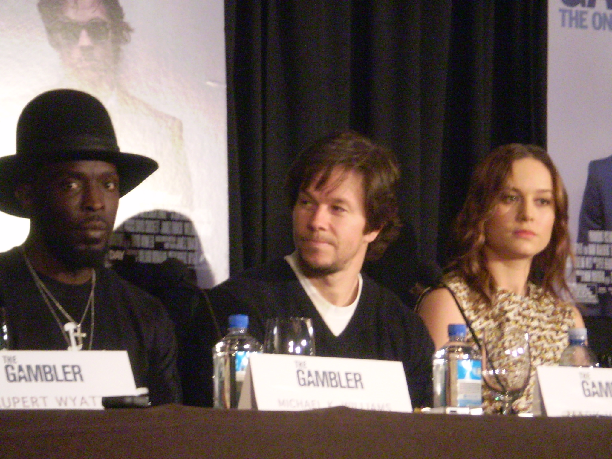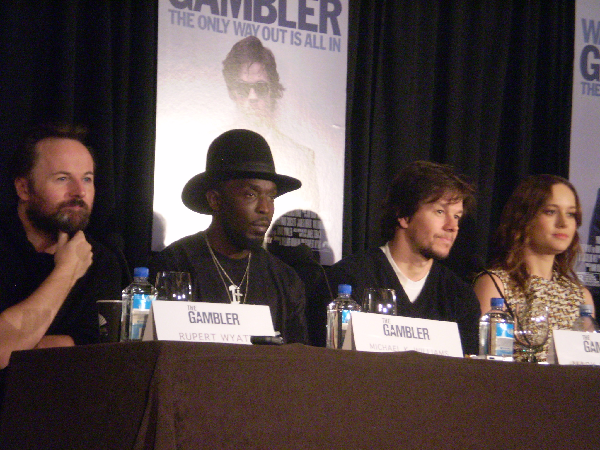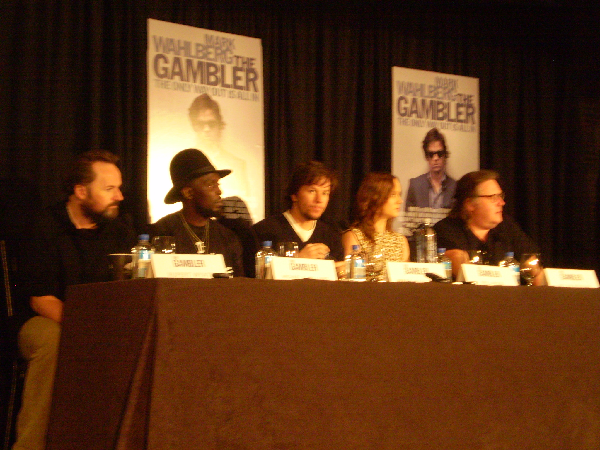Embarking on an unorthodox journey of self-discovery and identity, as you enthrallingly try to capture and expose who you really are, can be a taunting, yet equally liberating, experience. The rivetingly conflicted and flawed anti-hero in director Rupert Wyatt’s new crime thriller, ‘The Gambler,’ which is set to be released in theaters tomorrow, relies on excessive betting and borrowing money from mob bosses to fill an emotional void of not feeling adequate in life. The overtly complicated title character, Jim Bennett, purposely self-destructs in an effort to start over and find his true personality and purpose. Despite his disdain for the privileged life he has been accustomed to since his childhood, he still maintains a sympathetic dimension, as he strives to obtain the normal, conventional life he’s always desired.
‘The Gambler’ follows Jim (Mark Wahlberg) as he’s forced to contend with the recent death of his grandfather, who became one of the richest men in California through owning a bank chain. After attending his grandfather’s funeral, Jim, a highly-paid English professor at one of the local Los Angeles universities, visits an illegal casino, where he borrows $50,000 from Neville Baraka (Michael Kenneth Williams). After insulting the gangster and losing all of his money, Jim finds himself $260,000 in debt, as he also owes money to the operator of a gambling ring, Mr. Lee (Alvin Ing). Despite having an affluent job and coming from a wealthy family, Jim is unable to pay his two debts back within the allotted seven days the two mobsters offer him.
During his desperate attempts to gather the money he needs in order to pay off his debt, Jim begins a personal relationship with one of his students, Amy Phillips (Brie Larson). After he tells the entire class that Amy is the only one who has any talent and chance of succeeding at being a writer, and takes an interest in her work and where her career may take her, she begins to help him find a way out of his debt. Amy also supports Jim in his final attempt to rekindle his relationship with his mother, Roberta (Jessica Lange), who’s now in charge of the family bank and can help him pay off his debts. As Jim plays both of the gangsters, and garners the attention of a loan shark, Frank (John Goodman), who offers to help him as he generally wants to see him succeed, in the process, Jim must take the ultimate risk to obtain his much needed second chance in life.
Wyatt, Wahlberg, Williams, Larson and screenwriter William Monahan all generously took the time recently to talk about making ‘The Gambler’ during a press conference at New York City’s Mandarin Oriental Hotel. Among other things, the cast and crew discussed how the drama differed from the 1974 original film, which was directed by Karel Reisz and starred James Caan, as Wyatt viewed gambling in his movie as a representation of Jim’s determination to completely change his life, instead of a tool that launches a study of addiction; how Wahlberg utilized Monahan’s script, as well as his discussions with Wyatt about his character’s development and how he interacted with his co-stars on the set, into get into Jim’s mindset; and how Jim’s reflection on his interactions and relationships with the gangsters he owed money to helped prepare him to achieve redemption.
Question (Q): Rupert, what approach did you take to differentiate this film from the 1974 original movie?
Rupert Wyatt (RW): I knew of the original film, and the fundamental difference I saw when I read the script (for this film) was that it was less a study of addiction. I realized it focuses more on what it means to be a gambler in this world today, especially in western society, including the win or lose mentality. This is a guy who has everything and all of these social trappings, but is in a gilded cage and wants to escape. I found the anti-materialism element of the story fascinating; it’s about an overdog wanting to become an underdog. I think that’s a rare genesis.
Q: William, what was the process of writing the script for this version?
William Monahan (WM): Well, the 1974 film, which came out when I was 14, was about addiction. I come from a mindset where I think everything is voluntary, and people make choices to do things. So I don’t believe in addiction, per sey. There are obviously substance dependencies, but those are voluntary, too. So since I don’t believe in addiction, half of what was there to begin with fell away.
Q: Mark, do you believe in addiction? How much did the character of Jim, and the story, resonate with you?
Mark Wahlberg (MW): Yes, I do believe in addicition, to a certain extent. For me, this role was very different from anything I’ve ever done before. I am used to playing the underdog, as opposed to the guy who has everything, but is trying to strip himself of all that and become the underdog.
There are a lot of people in my life who suffer from addictions. Gambling was a big part of my upbringing, so those are things I identified with. The thing that most appealed to me was saying the words created by (Monahan), who also wrote ‘The Departed.’ So I’ll be the first one to sign up to say the words of William Monahan.
Q: Besides the dialogue William created for Jim, how did you approach portraying his emotions?
MW: Obviously I looked at the source material. Rupert and I also had a clear understanding of who Jim was, where he was going and how he was going to get there. Between the atmosphere Rupert created on the set, and the other actors really coming in with their A-game, I was able to get into Jim’s mindset. William also created all these great characters. So when it’s John Goodman’s moment, it’s his moment. So I was able to be there in the moment and react to him.
With all the different demands that came along with the part, I knew there was a light at the end of the tunnel. As much as it tortured my wife and everyone else I was around, I really just stayed in the moment. Since there was so much to do while making the film, I couldn’t get away from the character, even when I went home. I wouldn’t talk to my wife and kids the same way Jim spoke to his students, but it was certainly in the back of my mind. (laughs)
Q: The characters Mark, Brie and Michael all play aspire to achieve things, but their goals are different. So how did you all approach playing your characters, in relation to that idea?
Brie Larson (BL): I don’t think Amy has an agenda, which is why I enjoyed playing her so much. In my mind, when I read the script, I believed that these seven days of soul initiation, when he let’s go of things over the course of this week, that Amy has gone through those seven days before the movie began. So to him, she represents this place to get to.
MW: I think that’s why Jim loved her so much. He recognizes that that’s exactly what he’s looking for.
Michael K. Williams (MKW): Basically, I think Neville sees Jim as a mirror in some aspects. Jim is someone who, from the outside, seems to have everything: status, money and good looks. (laughs) People look at Neville and think of him in a similar fashion: women, money, power and respect. They’re both searching to get something better from life. The trappings of their world start to suffocate them, and I think that’s what attracted him to Jim.
Q: This story is a dark one about redemption. Towards the end of the film, do you think Jim Bennett actually changes his ways?
MW: Well, the great thing was that Rupert and I would always have those discussions. We talked about whether Jim was nervous about starting over, and getting through the danger he faced with Neville and John Goodman’s character, as well as the Korean gangsters. So that was a fun conversation to have.
RW: There’s a specific line of dialogue at the beginning of the movie spoken by Jim’s grandfather. He said, “I need to know what you’d be worth if I leave you nothing.” That’s the challenge that sets Jim off on this quest. He’s a guy who has everything and wants to get back to zero, and without giving too much away, that’s his goal. So it is a redemption and aspirational story in a funny sort of way. It’s a guy who is looking for a way out.
Jim realizes he lives his life by a code. He’s acting less like an addict, and more like someone who’s less in control of their actions. This is a guy who has a very clear agenda and attempt at self-destruction. He thinks if he can self-destruct, he can start over.
Q: Did you have discussions about how much Jim would make the people around him question how far he would take his bets?
BL: I don’t think Amy thinks Jim goes to the casino to win it all; she knows exactly what he’s doing. You see in the scene where they’re throwing the money back and forth that they’re really passing the power back and forth. She never touches his money while they’re at the casino; she buys her own drink. All she does is sit there and waits. He knows she’s there as a way to support him in this moment. But she doesn’t have any expectation of him changing. She’s just following him through this moment, hoping that he’ll go the right way. But if he doesn’t, that’s his choice.
Q: Michael, what was it like to finally be able to act alongside Mark on-screen?
MKW: I can’t tell you how relieved I was when I got to the set, and saw that Mark had lost 60 pounds. (laughs) But I was also freaking out, thinking, I have to get to the gym!
Mark is brilliant, and I think he’s amazing to watch and get to work with. He allows himself to get vulnerable, and give himself to the character. He really allowed Jim to shine. It wasn’t just his physical appearance; it was also his demeanor.
MW: I’ve known Michael for a very long time, before I ever acted in a movie, through mutual friends. Even though I executive produced ‘Boardwalk Empire’ (which Williams starred on), I never had the chance to appear alongside him on-screen. So it was great to get an opportunity to finally work with him on screen. He’s menacing in a very effortless way, but he was also very kind and gracious while on set.
Check out Shockya’s exclusive photos from ‘The Gambler’ press conference below.



Written by: Karen Benardello
